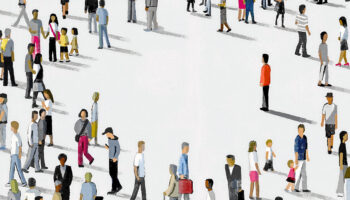Can Group Therapy Help with Loneliness?
The Nystrom & Associates provider consulted for this article on group therapy and loneliness was Brett Cushing, LMFT, host of Everyday Therapy Podcast.
Have you been feeling more lonely or isolated lately?
If so, you're not the only one. According to a recent Gallup poll, 1 in 5 Americans experience loneliness on a daily basis. And with the increase in social isolation, more people than ever are looking for ways to make real connections with others. For many people struggling with isolation, group therapy may be exactly what they need.
In this post, we'll cover three key ways in which group therapy can help combat loneliness and provide expert insights from one of our licensed therapists, Brett Cushing, LMFT.
Related: Is Online Therapy Effective? What Research Shows
What is Group Therapy?
There are almost as many types of group therapies as there are individual therapies, and groups meet for a variety of reasons. Some groups focus on substance use problems, relationship issues, self-harming behaviors, or other concerns. They can be done in-person, over video, or with a combination of participants in person and on video.
But ultimately, we can define group therapy as a group of 6-12 people who meet regularly under the guidance of one or more mental health professionals to overcome a common struggle. Groups typically run for 8-12 weeks and for 60-90 minutes per session, giving participants time to build trust and develop meaningful connections with others facing similar challenges.
The defining trait of group therapy is it’s led by one or more mental health providers. Groups like Alcoholics Anonymous (AA) or Narcotics Anonymous (NA), while very helpful for many people, are support groups that aren’t led by a mental health professional like a therapist or licensed social worker. Because therapy groups are led by a therapist, counselor, or other licensed provider, many insurance companies will cover it.
Related: Am I Covered? Navigating Insurance Coverage for Mental Health
How Group Therapy Can Help with Loneliness
As you probably know, being alone and feeling lonely are two very different things. Just being with people doesn’t automatically make you feel less lonely, and being alone doesn’t necessarily make you feel lonely.
Group therapy combats loneliness in ways that simply 'being around people' cannot. It creates genuine human connection through three essential elements: authentic community, meaningful validation, and supportive accountability.
Let’s dive into all three of these benefits.
Related: Being Alone Versus Feeling Lonely
Building Authentic Community to Combat Isolation
“Group therapy is arguably more necessary and beneficial today than ever,” says Licensed Marriage and Family Therapist Brett Cushing, “We're so much more isolated than we used to be, and group therapy can really help by providing an authentic community where people can be real with each other.”
The key difference between being around other people and having an authentic community is that you feel like you can be your true self with them. When group therapy is led by an experienced mental health provider, group members are encouraged to be honest and share their real problems with other members. For many people, this experience of being truly seen and understood by others facing similar challenges provides the authentic connection that combats loneliness in ways that casual social interaction simply can’t.
Related: Recovery: How to Take Your First Steps
Finding Validation in Group Therapy
Another way that group therapy lessens loneliness is through the power of validation from others who truly understand your struggles. One of the biggest lies that mental health challenges tell you is that you're alone in this experience. But in group therapy, members discover they're far from alone, and this realization happens through giving and receiving validation. Validating someone means acknowledging that their struggles are real and their experiences matter. When your struggles are validated, you can start feeling less alone.
Brett, who leads Dialectical Behavior Therapy (DBT) groups, often asks his group members: 'When in your life have you taken an hour of your week just to focus on giving and receiving validation?' The answer, he notes, is usually 'never.' This mutual recognition and understanding creates connections that directly combat the isolation fueling loneliness.
Supportive Accountability without Judgment
Accountability – having someone check in with you on your goals – doesn’t strike many as a way to combat loneliness. Brett says that’s because “the word ‘accountability’ is closely associated with judgment and criticism,” which can make someone feel even more isolated.
However, when accountability is paired with nonjudgment and support, it can be truly affirming. “When group therapy is run well,” he says, “It’s free of judgment.” This creates a space where group members can honestly share their struggles and receive encouragement rather than criticism.
This freedom from judgment allows group members to be authentic and honest about their challenges. As we’ve seen, this authenticity is a key part of the community aspect of group therapy and a main way it helps ease loneliness.
Related: Can Self-Compassion Exercises Help You Achieve Your Goals?
Is Group Therapy Right for You?
Despite the many benefits of group therapy – including reducing loneliness – many people feel hesitant or anxious about starting. If you’re feeling this way, you’re not alone. Opening up and being vulnerable in a group setting can be difficult, but paradoxically, you may find that vulnerability to be what helps create a strong bond with others, reducing the loneliness that you’re feeling.
Brett says this phenomenon tracks with how mental health treatment usually works. “Getting help for your mental health is, generally speaking, about moving towards things that bring you discomfort or anxiety in a safe setting with a mental health professional,” he explains, “Group therapy provides a great opportunity for us to lean into the vulnerability and insecurities we’re avoiding.”
Often the thing we’re so afraid of is the exact thing we need – being seen and known by others. "When that happens, that's where change really begins," Brett says. "People start to have hope and realize they're not alone."
Get Started Today
If you’re interested in starting group therapy or individual therapy, please reach out. Whether you're experiencing anxiety, depression, trauma, relationship challenges, or other mental health concerns, we’re here to help. Our caring professionals work with you to develop personalized treatment plans that address your specific situations and goals.
Call 1-844-NYSTROM or request an appointment online to get help today!






